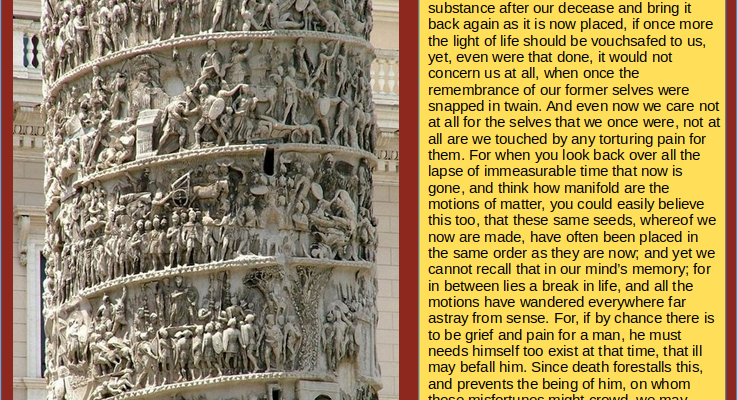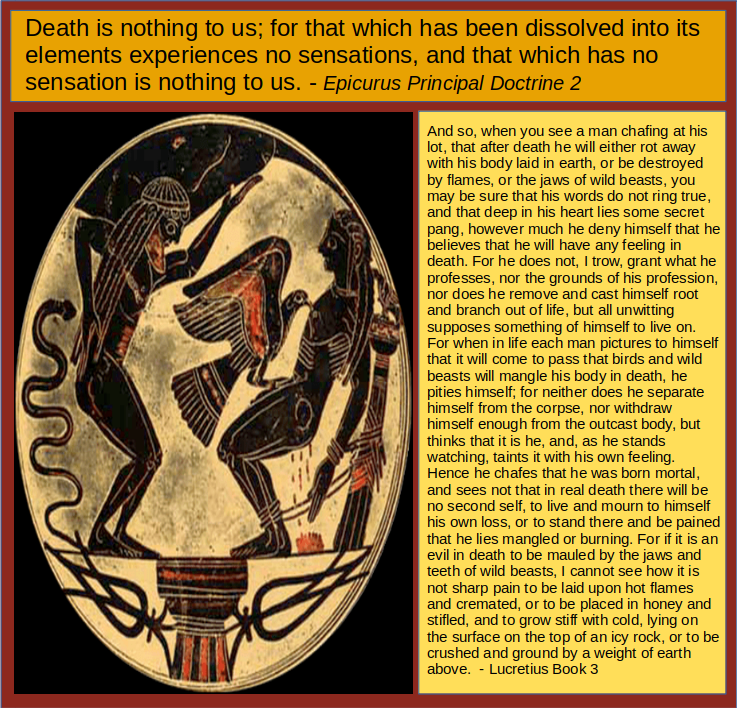Principal Doctrine Two – Death Is Nothing To Us
Epicurus Principal Doctrine Two: “Death is nothing to us; for that is dissolved is without sensation, and that which lacks sensation is nothing to us.”
If there is any one doctrine that is absolutely clear and which distinguishes Epicurus from most other philosophers, it is that death is the end of “us” as we know it. Epicurus held that this single present lifetime is the only one that we will ever have, and the ethical implications of this are expanded in numerous sayings.
Leaving aside the extended implications, even the fundamental point of what Epicurus meant by “death is nothing to us” is not without controversy. (1) Does this mean that “dying” is of no relevance to us? Or does it mean that “the state of being dead” after we depart from life is nothing to us? (2) Does this doctrine mean that it makes no difference how long we live? Or is it perfectly sound Epicurean doctrine to want to live as long as we can continue to live happily?
My personal answers to these questions are: (1) The doctrine is focused on the state of being dead, not on the act of dying. We will not exist after death to have any concerns at all, but we certainly are concerned **during life** both by our manner of death (how much pain we will encounter in dying, as well as by the thought of what will happen to those we leave behind after we die. (2) This doctrine does *not* mean that we are unconcerned with how long we live. Life is desirable (and Epicurus clearly says so in the letter to Menoeceus). Even though we are not “gods” who can life forever, it is desirable for us to experience as much happiness as we can during this life, our only opportunity to experience pleasure. All other things being equal, it seems to me that an Epicurean should prefer to live fifty years of happiness rather than five.
Questions like this deserve a lot of thought. Please comment on the text and consider sharing the thread. Lucretius gives us many word pictures from which to prepare graphics, but can you compose a graphic that would better illustrate this Epicurean point? Please add your own version to this thread, and we will use these in the future to help spread the ideas of Epicurus on the internet.
Epicurus in his letter to Menoeceus: “Accustom yourself to believing that death is nothing to us, for good and evil imply the capacity for sensation, and death is the privation of all sentience; therefore a correct understanding that death is nothing to us makes the mortality of life enjoyable, not by adding to life a limitless time, but by taking away the yearning after immortality. For life has no terrors for him who has thoroughly understood that there are no terrors for him in ceasing to live. Foolish, therefore, is the man who says that he fears death, not because it will pain when it comes, but because it pains in the prospect. Whatever causes no annoyance when it is present, causes only a groundless pain in the expectation. Death, therefore, the most awful of evils, is nothing to us, seeing that, when we are, death is not come, and, when death is come, we are not. It is nothing, then, either to the living or to the dead, for with the living it is not and the dead exist no longer.”
Lucretius mirroring Epicurean doctrine in “De Rerum Natura”:
Death, then, is naught to us, nor does it concern us a whit, inasmuch as the nature of the mind is but a mortal possession. And even as in the time gone by we felt no ill, when the Poeni came from all sides to the shock of battle, when all the world, shaken by the hurrying turmoil of war, shuddered and reeled beneath the high coasts of heaven, in doubt to which people’s sway must fall all human power by land and sea; so, when we shall be no more, when there shall have come the parting of body and soul, by whose union we are made one, you may know that nothing at all will be able to happen to us, who then will be no more, or stir our feeling; no, not if earth shall be mingled with sea, and sea with sky.
And even if the nature of mind and the power of soul has feeling, after it has been rent asunder from our body, yet it is naught to us, who are made one by the mating and marriage of body and soul. Nor, if time should gather together our substance after our decease and bring it back again as it is now placed, if once more the light of life should be vouchsafed to us, yet, even were that done, it would not concern us at all, when once the remembrance of our former selves were snapped in twain. And even now we care not at all for the selves that we once were, not at all are we touched by any torturing pain for them. For when you look back over all the lapse of immeasurable time that now is gone, and think how manifold are the motions of matter, you could easily believe this too, that these same seeds, whereof we now are made, have often been placed in the same order as they are now; and yet we cannot recall that in our mind’s memory; for in between lies a break in life, and all the motions have wandered everywhere far astray from sense.
For, if by chance there is to be grief and pain for a man, he must needs himself too exist at that time, that ill may befall him. Since death forestalls this, and prevents the being of him, on whom these misfortunes might crowd, we may know that we have naught to fear in death, and that he who is no more cannot be wretched, and that it were no whit different if he had never at any time been born, when once immortal death hath stolen away mortal life.
And so, when you see a man chafing at his lot, that after death he will either rot away with his body laid in earth, or be destroyed by flames, or the jaws of wild beasts, you may be sure that his words do not ring true, and that deep in his heart lies some secret pang, however much he deny himself that he believes that he will have any feeling in death. For he does not, I trow, grant what he professes, nor the grounds of his profession, nor does he remove and cast himself root and branch out of life, but all unwitting supposes something of himself to live on. For when in life each man pictures to himself that it will come to pass that birds and wild beasts will mangle his body in death, he pities himself; for neither does he separate himself from the corpse, nor withdraw himself enough from the outcast body, but thinks that it is he, and, as he stands watching, taints it with his own feeling. Hence he chafes that he was born mortal, and sees not that in real death there will be no second self, to live and mourn to himself his own loss, or to stand there and be pained that he lies mangled or burning. For if it is an evil in death to be mauled by the jaws and teeth of wild beasts, I cannot see how it is not sharp pain to be laid upon hot flames and cremated, or to be placed in honey and stifled, and to grow stiff with cold, lying on the surface on the top of an icy rock, or to be crushed and ground by a weight of earth above. “
And this is only the beginning of the section! The full extended discussion of death can be found at the end of book three of Lucretius.
The current gallery of graphics for PD2 is here.


